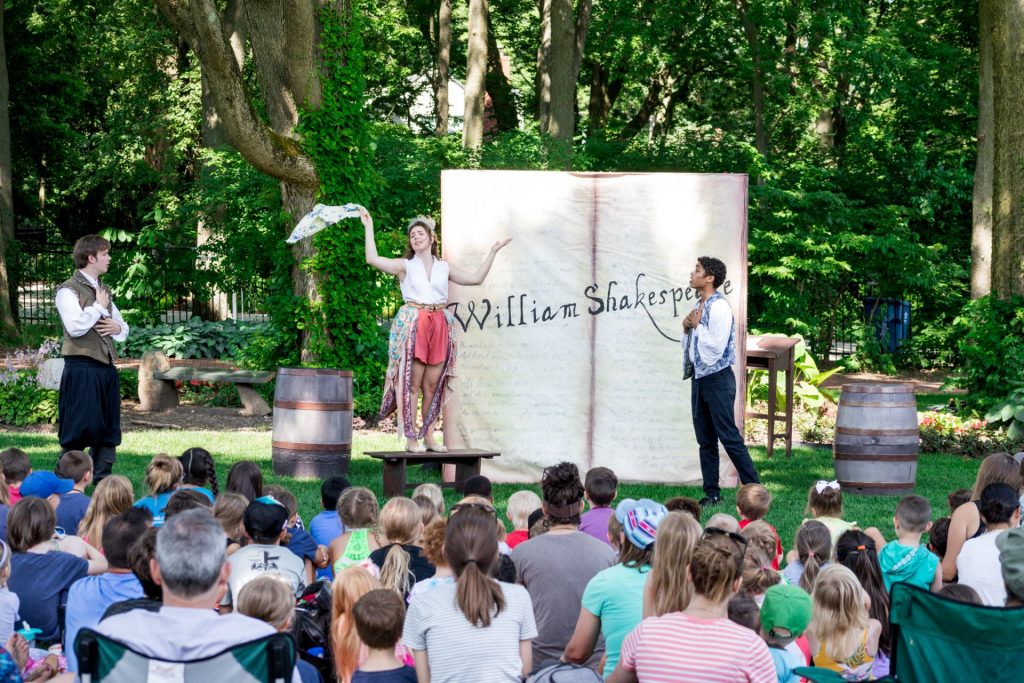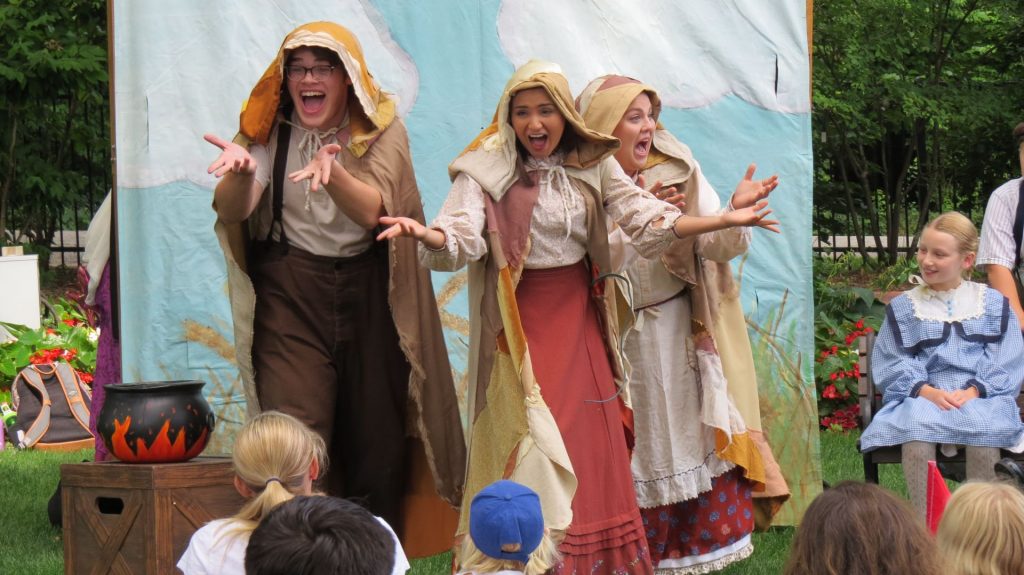Festival Dramaturg Kee-Yoon Nahm spoke with playwright Nancy Steele Brokaw and director Lori Adams about Illinois Shakespeare Festival’s upcoming Theatre for Young Audiences (TYA) show A Summer’s Winter Tale. The show will be offered free of charge every Thursday and Saturday morning at 10 a.m. beginning July 3, 2021.
Kee-Yoon Nahm (KYN): I have been asking theatre artists how they have been affected by the coronavirus (COVID-19) pandemic in these interviews. How has COVID-19 impacted your work?

Lori Adams (LA): I was going through stacks of things I have in my makeshift office at home. I got to the bottom of one of the stacks and there was the script for last year’s Green Show. I remember that Nancy, Kelsey Fisher-Waits, John Stark, and I read through the Green Show and TYA show scripts in March 2020, during spring break. I think we had a bowl of chili or something like that. We sat around, cast these scripts among ourselves, and got so excited about doing them. But then, a few days later, of course, it was over.
The beauty of these shows is that Nancy writes them specifically for the titles that are being presented that summer. One we had planned for last year was based on Macbeth, which we cannot do this year. So, Nancy, this amazing woman, wrote a whole new play without even getting to see the last one done. That is what struck me. Wow, here we are more than a year later. As we read through A Summer’s Winter Tale together the other day, I felt like I just got back on the horse.
KYN: What about you, Nancy? How has this past year been for you as a writer?
“I wanted to explore the power of being able to say: ‘I messed up. I’m sorry.'”
Nancy Steele Brokaw

Nancy Steele Brokaw (NSB): For decades, I would go to a coffee shop or the Illinois Wesleyan Library to write. But I suddenly had to write in my house where there are all these distractions. Writing is hard—at least I think it is hard. So, it is easy to think: ‘Oh, I will put out a pot of soup first.’ Or ‘Oh, I will do the laundry and then try to figure out how to tell the story of A Winter’s Tale with only four actors.’ I did it, though. I wrote several shows over the pandemic in my house. But going forward, I am very glad to not be writing in my own house anymore.
KYN: Will you talk about the TYA show this year? It is called A Summer’s Winter Tale, which I think is a delightful title. What was your process for writing this play?
NSB: As you know, this is a big, complicated, and magical story. Telling that story for kids presented all kinds of challenges. But I like challenges. When I write TYA plays, I am always looking for what is lying underneath the story that is relevant to the time we are in. I felt now is a good time to plant the idea in kids that there are second chances in life. I mean, we are all kind of getting a second chance coming out of the pandemic. Based on Shakespeare’s play, I wanted to explore the power of being able to say: “I messed up. I’m sorry.”
KYN: I always enjoy your plays, Nancy, and I loved reading A Summer’s Winter Tale. I am amazed by how you effortlessly make Shakespeare accessible to a wider audience. I am not just talking about children.
For people less familiar with The Winter’s Tale, the TYA show works as a great introduction. Despite the fairy tale setting, I think there are a lot of themes in Shakespeare’s play that resonate with older audiences who may have fallen into certain patterns and habits in life. It presents the possibility of change. Do you think the TYA show can appeal to adults as well?
LA: Historically, the TYA show has been primarily focused toward children, although adults come see it, too. Meanwhile, we typically perform the Green Show just prior to the main production that evening. So, that show is geared more towards people who have already come to see Shakespeare. Oftentimes, the Green Show helps lay out the plot of the Shakespeare play, which is helpful to people who do not know it well. I told Nancy that what she has done magically with A Summer’s Winter Tale is combine the two: Theatre for Young Audiences and Green Show. We were discussing that perhaps this show could be billed for adults as well.
But I want to go back to the theme that Nancy pulled out of The Winter’s Tale: “I messed up. I’m sorry.” I cannot think of a person who has not been in that place many times in their lives. It is about forgiveness by others but also forgiveness of oneself. I am looking forward to sharing that with the audience. I think the kids will go there with us, and hopefully the adults will too. Nancy always incorporates audience participation so skillfully in her plays. It will be a lot of fun for children and adults, with lots of singing together.
KYN: Speaking of audience participation, I remember Rebekah Scallet, the director of The Winter’s Tale, saying that part of the problem in Sicilia is that no one stands up to Leontes’ tyranny. Leontes is left largely alone for his paranoia to fester. What I like about Nancy’s take on the play is that Leontes is actually never alone. There is a chorus of actors and audience members who urge the king to do the right thing. Despite the miraculous conclusion, I feel an undercurrent of loss and tragedy in The Winter’s Tale. But I think your version has a safety net so that the characters are protected from their mistakes, thanks to the audience. How do you think about audience participation when you write plays, Nancy?
NSB: The audience participation is different in every show. We have been including more and more singing in recent years. I saw on Tic Toc that sea shanties were really hot right now. So, I thought it would be fun if we sang “Sailing, Sailing, Over the Bounding Main” to get from one kingdom to the other. It will be fun to teach this old sea shanty to kids who probably do not know it.
KYN: What kind of experience do you want to create for younger audiences? Even if this is not their first time at the theatre, most of them would be coming to a live performance after over a year of staring at screens.
NSB: There are always two overriding goals in my mind for the TYA show. One is for the young audience to think: ‘Oh, Shakespeare is cool. I might want to learn more about Shakespeare.’ This is more important than knowing every plot point in The Winter’s Tale. But then, secondly—and Lori is great at this—we have always worked to show the magic of theatre. The actors are playing so many roles, and the show is outside without an elaborate set. Hopefully, kids will think: ‘Gosh, I could grab my dad’s coat or my mom’s high heels or whatever and put on my own show.’
LA: I could not agree with Nancy more. There is no hiding the fact that this character walked offstage and then came back as someone else, or even simply changed their hat. That is the magic of theatre. Get your imagination going and have fun!
“It is about forgiveness by others but also forgiveness of oneself. I am looking forward to sharing that with the audience.”
Lori Adams
KYN: Even for adults, I think we all have to relearn a little bit how to use your imagination in the theatre. It seems like you two are completely on the same page. How long have you worked together?
LA: I do not remember. Fifteen years or something like that. We have a real rhythm to the way we work. We almost do not have to say anything to each other anymore.
KYN: It has not always been Shakespeare, right? You have done other things together as well. Is it different when you work on a show that is based in Shakespeare? I feel that there is a great cultural reservoir that you are able to tap into, even if the play is intended for children. Even though A Summer’s Winter Tale is shorter and simplified, it still has all the important elements of Shakespeare’s play in it.
NSB: I do a lot of research before I start writing. There are also subtle things that we usually discover as we rehearse. For example, a lot of Shakespearean critics say that the ending of The Winter’s Tale has an almost Biblical feel. So, I tried to mimic that a little bit by bringing in some of the liturgical elements from the King James Bible—in a subtle way, of course. I also research performance history. The moment in my script where Hermione trips because she is pregnant with a full belly and Polixenes catches her, setting off Leontes’ fit of anger, that was taken from the way it was done in one production.
KYN: I have written about some of these things in the “Beyond the Stage” dramaturgy article series. But you have done a beautiful job presenting these ideas in a way that is easy to understand. Lori, what about from the director’s perspective? Does Shakespearean acting training still come in handy even though the language is not all Shakespeare?
LA: Compared to other projects that Nancy and I have collaborated on, the actors do need a facility with Shakespeare’s language for the TYA shows. As Nancy says in her foreword to the script, the goal is for people to “hear real Shakespeare words–but not too many.” I think she does it just enough to train the audience’s ear, no matter how old they are.
I am an acting teacher, so I trust the actors. Once they get it in their bones, the show just starts to grow. But occasionally, I have to remind them about what we are trying to say through this show, which is different from the main production of The Winter’s Tale. One of the directions I give the most is to remember that everything that happens in this theatre for young audiences is ultimately for something good to come out. Not that there cannot be moments of seriousness and profound change, but we are not telling a story about darkness and evil. Bad choices can be made but they are always redeemable.
NSB: Many of the actors in the TYA cast have not acted for kids. And we have two, three, four-year-olds in the audience. So, you do not want to sound legitimately angry. Lori always tells the actors to not come from a place of anger in your voice. It is amazing to see the actors make that adjustment.
KYN: As a final question, what would you say to encourage parents to bring their kids to come see A Summer’s Winter Tale?
LA: Well, I would encourage not only parents, but grandparents and aunts and uncles to just come out and sit on the grass at Ewing Manor and enjoy some theatre.
NSB: The only thing I would add to that is that you do not have to bring a child. We have lots of adults who come to see the TYA show. It is free, you can bring your own chair and socially distance according to your comfort level. You can learn some of Shakespeare’s words—but not too many!—and have a good time in a community with people who are doing something both meaningful and fun.
KYN: You can dip your toes in Shakespeare, and if you like it, maybe wade over to the deeper end.
NSB: Yes, the TYA show can be a gateway to Shakespeare.



